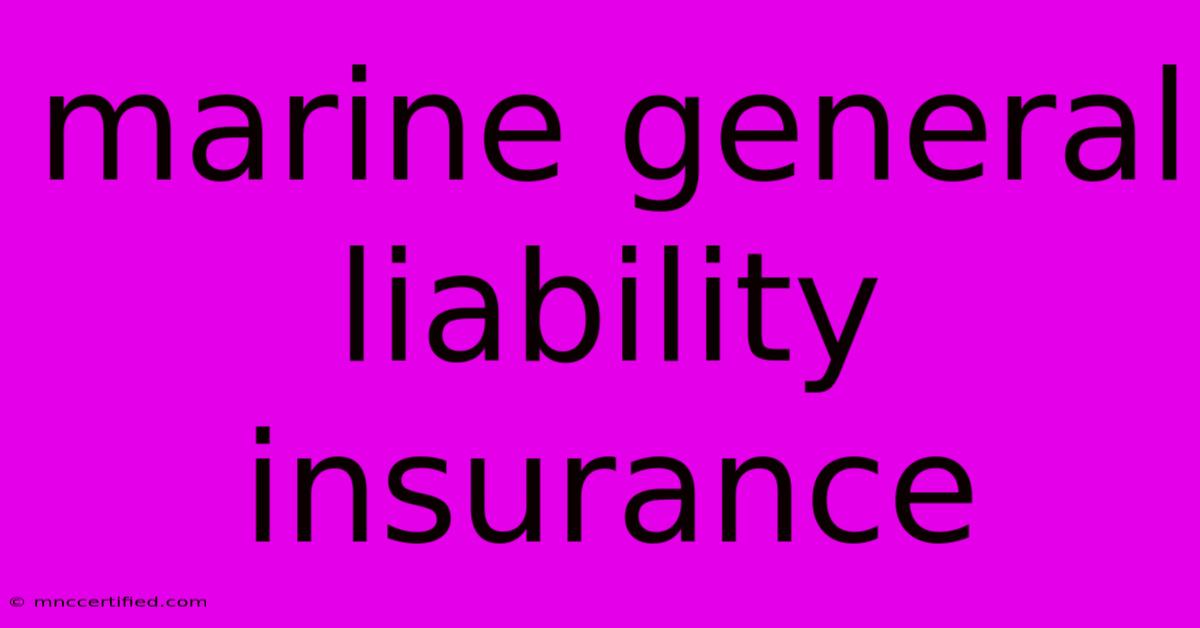Marine General Liability Insurance

Table of Contents
Navigating the Waters of Marine General Liability Insurance
Marine-related businesses face unique risks. From slips and falls on docks to damage caused by equipment malfunction, the potential for liability is significant. That's where marine general liability insurance comes in. This crucial coverage protects your business from financial ruin caused by accidents, injuries, or property damage related to your marine operations. This comprehensive guide will help you understand the ins and outs of this vital insurance policy.
What is Marine General Liability Insurance?
Marine general liability insurance, often a component of a broader commercial insurance package, safeguards your business against third-party claims of bodily injury or property damage. This means if someone is injured on your property or due to your operations, or if your business causes damage to someone else's property, this insurance will help cover the costs associated with legal fees, settlements, and judgments. Unlike marine cargo insurance (which covers goods in transit), this policy specifically addresses liability arising from your business operations.
Key Coverages Included:
- Bodily Injury: Covers medical expenses, lost wages, and pain and suffering for individuals injured on your premises or as a result of your operations (e.g., a customer slipping on a wet dock).
- Property Damage: Covers the cost of repairing or replacing property damaged by your business (e.g., damage to a client's boat during maintenance).
- Advertising Injury: Protects against claims arising from libel, slander, or copyright infringement in your advertising materials.
- Personal and Advertising Injury: Covers injuries caused by offenses like libel, slander, or invasion of privacy.
Who Needs Marine General Liability Insurance?
A wide range of marine businesses benefit from this type of coverage. It's particularly vital for:
- Boat repair shops: Protecting against liability for damage to clients' boats or injuries sustained during repairs.
- Marina operators: Covering slips, falls, and other accidents on their premises.
- Charter boat businesses: Protecting against accidents or injuries during charter operations.
- Boat dealerships: Covering liability for damage or injury caused by boats on their lot or during test drives.
- Water sports operators: Protecting against injuries sustained during activities like jet skiing or parasailing.
- Fishing charter companies: Covering accidents or injuries during fishing trips.
Understanding Exclusions and Limitations
While marine general liability insurance offers extensive protection, it's crucial to understand its limitations. Common exclusions may include:
- Pollution: Environmental damage caused by your operations is often excluded, requiring separate pollution liability insurance.
- Employee injuries: Workers' compensation insurance covers injuries to your employees.
- Intentional acts: Damage or injury caused deliberately is typically not covered.
- Specific named perils: Some policies might exclude specific high-risk activities.
Choosing the Right Policy: Factors to Consider
Selecting the right marine general liability insurance policy requires careful consideration of several factors:
- Your specific business activities: The level of risk varies significantly between different marine businesses.
- Your revenue: Higher revenue typically necessitates higher coverage limits.
- Your location: Policies can vary in cost depending on the location of your business.
- Your insurance history: A clean claims history often leads to lower premiums.
Premium Costs: The cost of marine general liability insurance varies greatly depending on the factors listed above. Obtaining quotes from multiple insurers is essential to find the best value for your needs.
The Importance of Adequate Coverage
Failing to secure adequate marine general liability insurance can expose your business to significant financial risks. A single lawsuit resulting from an accident or injury could cost hundreds of thousands, or even millions, of dollars. This could lead to bankruptcy and the closure of your business. Investing in the right policy is a proactive measure to protect your financial future.
Beyond Insurance: Risk Management Strategies
Insurance is a crucial element of risk management, but it shouldn't be your sole strategy. Implementing proactive measures to reduce accidents and injuries is equally important. Consider:
- Regular safety inspections: Regularly inspect your premises and equipment to identify and address potential hazards.
- Employee training: Train your employees on safe work practices and emergency procedures.
- Clear signage: Post clear and visible signage to warn of potential hazards.
- Maintaining proper documentation: Keep meticulous records of inspections, training, and safety procedures.
By combining a robust insurance policy with proactive risk management strategies, you can significantly mitigate the risks inherent in operating a marine business. Don't navigate these waters alone; secure the protection you need with comprehensive marine general liability insurance.

Thank you for visiting our website wich cover about Marine General Liability Insurance. We hope the information provided has been useful to you. Feel free to contact us if you have any questions or need further assistance. See you next time and dont miss to bookmark.
Featured Posts
-
Fisher Brown Bottrell Insurance
Nov 23, 2024
-
Investment Boost Liontrusts New System
Nov 23, 2024
-
Main Street Insurance St George
Nov 23, 2024
-
Pereira Leads Sporting In Cup Bid
Nov 23, 2024
-
F1 2024 Vegas Gp Qualifying And Race Start
Nov 23, 2024